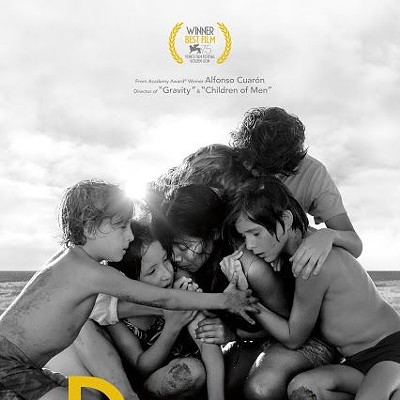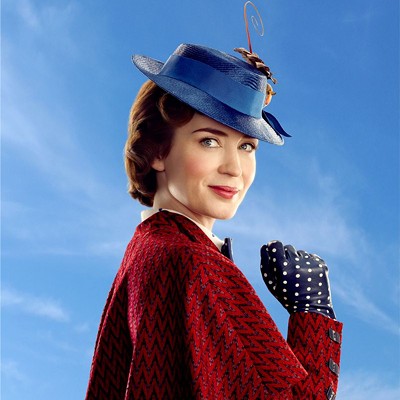V FOR VENDETTA
One irate citizen’s Margaret Thatcher is another’s George W. Bush, which might explain why writer Alan Moore has distanced himself from V For Vendetta, the big-screen adaptation of his influential graphic novel. Penned in 1989, Moore meant for his work to be taken as an indictment of Thatcher’s conservative platform in England. The screen version, filtered through the sensibilities of Hollywood players like debuting director James McTeigue, producer Joel Silver and the writing-producing team of The Wachowski Brothers (all of whom were involved in the making of the Matrix trilogy), has been upgraded for a new chapter in world history. Set in England in the year 2020, V For Vendetta envisions a world that’s been torn apart by all manner of conflicts. The United States, we’re told, has fallen as a superpower and now lays in ruins. England, meanwhile, struggled with a dreadful plague that killed thousands but has since reemerged under the rule of a fascistic government headed by Chancellor Sutler (John Hurt). Dissidents, intellectuals and homosexuals all meet with the same fate -- execution -- while all news is filtered through the sensibilities of a government-sanctioned TV network. Evey Hammond (Natalie Portman) is a low-level worker at the TV station, yet she’s also the daughter of political activists who were dragged off -- and summarily murdered -- by government thugs when she was still a child. She meets V (Hugo Weaving), an eloquent swashbuckler who sports a Guy Fawkes mask and speaks of a regime change. A man of mystery, V subscribes to the theory of a radical revolution, of achieving freedom by any means necessary. What exactly divides a terrorist from a freedom fighter? V’s mission involves blowing up lots of prime real estate (indeed, the movie’s November 2005 release was delayed partly to distance it further from last July’s London bombings), and those in charge refer to him simply as “the terrorist.” But when a government is as rotten as the one seen here, does the end justify the means? Because his face is hidden behind an immobile mask, Hugo Weaving relies on his voice and movements to bring life to the role of V -- he succeeds even when the script fails to sufficiently flesh out the role. Yet the performer to watch here is Natalie Portman. Heroines in fantasy flicks often get swallowed up by the extravagance surrounding them, yet Portman’s work is excellent, existing on a par with Aliens’ Sigourney Weaver, The Terminator’s Linda Hamilton and King Kong’s Naomi Watts.
FAILURE TO LAUNCH
About the only surprising element in Failure to Launch is that director Tom Dey (Shanghai Noon) feels the urge to show us a butt-naked Terry Bradshaw not once, not twice, but three times. This decision is certain to have Howie Long clucking his tongue on Bradshaw’s Fox NFL Sunday pre-game show, but it’s hardly the selling point to women lining up to ogle Matthew McConaughey (who only removes his shirt) for 100 minutes. Then again, Bradshaw (clothed) and the other supporting players are the ones who provide any semblance of a pulse to this lifeless film that’s never able to sell us on its central conceit. McConaughey plays Tripp, a 35-year-old who still lives at home with his parents (Bradshaw and Kathy Bates). Anxious to move their grown boy out of the house, the folks hire Paula (Sarah Jessica Parker), a professional consultant who -- get this -- makes a career out of building up the self-esteem of adult males still living at home by romancing them and then dumping them once they feel independent enough to move out on their own. (The film never once addresses the obvious morality issue: Wouldn’t these pudgy, LOTR-lovin’ fanboys relapse into self-doubt and depression once Paula drops them?) But Paula soon discovers that Tripp isn’t like her other clients, which leads to a sputtering romantic comedy that moves like clockwork through all the expected plot predicaments. McConaughey and Parker try, but they can’t save a premise as insipid as this one. Instead, the fun can be found in the margins: Bradley Cooper and Justin Bartha have their moments as Tripp’s best friends, the always welcome Zooey Deschanel adds some much-needed edge as Paula’s droll roommate, and Bates and Bradshaw invest their characters’ relationship with the humor and empathy that’s sorely missing from the top-billed stars’ dalliances.
THE SHAGGY DOG
Imagine if someone decided to remake David Cronenberg’s excellent horror yarn The Fly as a wretched Disney family film, and you would basically get The Shaggy Dog. Borrowing elements from both 1959’s The Shaggy Dog and 1976’s The Shaggy D.A. but mostly wandering off in its own direction, this new Dog casts Tim Allen as an assistant district attorney who periodically turns into a canine after being bitten by a 300-year-old sheepdog. The lack of a speaking voice (aside from woofs) makes it impossible for him to communicate with those around him, but it’s after his metamorphosis that he realizes he’s not only been neglecting his family but also serving as counsel for an evil scientist (Robert Downey Jr., whose talents deserve better) who’s been experimenting on animals in his laboratory. Allen, one of the least funny comedians around, is given far too many opportunities to grotesquely ham it up -- for his next film, how about a nice, quiet role as a corpse? -- while Spencer Breslin, arguably the most annoying child actor in cinema history, adds to our misery as Allen’s son, a dweeb with a jones for all things Grease (friends insist he’d be the “best” choice to appear in their school’s production, though his rendition of “You’re the One That I Want” sounds like a cat being shoved tail-first into a blender). In between Allen’s mugging and lame slapstick sequences, we’re treated to a parade of creepy CGI effects; still, even these aren’t as disturbing as the sight of Allen lifting his leg while using a urinal, or a shaggy Allen telling another dog that “maybe later” he’ll sniff his butt. As for the unspoken Cronenberg implications, how should we envision any future offspring produced by an infected Allen and his wife (Kristin Davis)? The mind boggles.
16 BLOCKS
Rapper-turned-actor Mos Def is paired with action vet Bruce Willis, but just because director Richard Donner is behind the controls doesn’t mean we should worry that this will turn out to be a pale imitation of Donner’s tiresome Lethal Weapon buddy flicks. 16 Blocks may be full of shootouts and laced with humor, but it’s mercifully free of the jokey nature and penchant for overkill that dogged the inexplicably popular Mel Gibson-Danny Glover franchise. Willis, admirably looking his age and then some, stars as New York detective Jack Mosley, a badge-carrying bum whose love for the bottle has reduced him to a has-been on the police force. One morning after working the night shift, he’s ready to head for home (or a nearby bar) when he’s ordered to transport a petty criminal from the jail to the courthouse 16 blocks away. He has two hours to deliver the man, but really, it’s a job that should only take 15 minutes, tops. But it turns out Eddie Bunker (Mos Def) isn’t your ordinary punk picked up for snatching a purse or stealing a TV set. Instead, Eddie is the key witness in a case in which he’s expected to testify against some crooked cops. Jack doesn’t know this at the outset; it’s only when someone attempts to shoot Eddie en route that he realizes something big is going down.
THE LIBERTINE
Bawdy period sex comedies are nothing new -- they’ve been around at least since 1963’s Tom Jones hightailed it back to England with the Best Picture Oscar in hand. At first glance, The Libertine appears to be a modern attempt to jump-start the sub-genre, to wrest the costume epic away from the prim and proper Austen adaptations and steer it back to a sensibility that owes as much to Benny Hill as to any literary tome. But it soon becomes apparent that The Libertine is marching to its own beat: The humor is dipped in poison, and the end result of its sexual revolution isn’t bare arses and jiggling breasts but rather the physical deformities and uncontrollable bowel movements brought on by syphilis. Based on a stage play (and it shows), The Libertine tells the story of John Wilmot (Johnny Depp), a.k.a. the second Earl of Rochester. At the film’s outset, this 17th century poet, playwright and sex fiend turns to us and insists that we won’t like him, at which point he proceeds to spend the remainder of the running time cruelly berating nearly everyone who enters his atmosphere, even Charles II (John Malkovich). The one exception is the budding stage actress Elizabeth Barry (Samantha Morton), yet she proves to be the one person that a smitten Rochester cannot best. In casting the role of Rochester, the filmmakers had the right idea by turning to Depp -- this maverick has proven himself to be among the most fearless thespians out there -- but ultimately, he’s not required to do more than mix profanity with profundity and allow himself to be subjected to lengthy sessions in the makeup artist’s chair. For all its attempts to startle us with its vulgarity, this underdeveloped movie never locates a defining method to its messiness; ultimately, it possesses all the shock value of a toddler yelling, “Poopy!”
DAVE CHAPPELLE’S BLOCK PARTY
Dave Chappelle, amusingly commenting that he's mediocre at both comedy and music yet able to make a fortune nonetheless, heads to his Dayton, OH, hometown to hand out golden tickets to attend his block party in Brooklyn. Chappelle invites everyone from young black dudes to elderly white women to attend his shindig, which turns out to be a celebration of hip-hop music: Among those taking part in the musical mirth are Kanye West, Mos Def, Erykah Badu (removing her wig at one point) and the reunited Fugees. Dave Chappelle's Block Party, not so much directed as observed by Michel Gondry (Eternal Sunshine of the Spotless Mind), is unique in the manner in which it salutes African-American culture and unity while at the same time exhibiting an exalted openness that makes it clear everyone's invited to take part in the merriment. The comic material is spotty -- some gags work better than others -- but the sizzling concert performances are the primary attraction anyway.
EIGHT BELOW
Parents taking their kids to catch this at a matinee showing should reasonably be expecting a dog day afternoon; instead, those perky creatures known as actors keep getting in the way of total enjoyment. Based on a Japanese film that was itself inspired by a true story, Eight Below relates the tale of a scientific expedition in Antarctica and what happens when punishing weather forces its members to leave their eight sled dogs behind. As the animals spend months coping with exhaustion, starvation and a particularly nasty leopard seal, expedition guide Jerry Shephard (Paul Walker) desperately tries to find a way to rescue them. The dogs are gorgeous and wonderfully expressive (no creepy Snow Dogs-style anthropomorphizing here, thank God), and as long as director Frank Marshall and debuting scripter Dave DiGilio focus on their part of the story, the movie succeeds in the grand tradition of past Disney live-action adventures. But the picture runs an unpardonable two hours (can little kids’ bladders hold out that long?), and its length is felt in the countless scenes centering on Jerry: his romance with a pilot (Moon Bloodgood), his bantering with a co-worker (Jason Biggs, heavy on the shtick) and his pity parties as he agonizes over the potential loss of his dogs (watching Walker try to convey brooding introspection and angst is never a pretty sight). At 95 minutes, this would have been a winner; maybe the DVD will include a function that will allow viewers to edit out the humans and leave only the remarkable canines.
MRS. HENDERSON PRESENTS
Except for her atypical (and smashing) performance in Iris, Judi Dench has been delivering the exact same performance dating back to 1997's Mrs. Brown and running through last fall's Pride & Prejudice -- that of the frosty, tart-tongued Englishwoman who's clearly smarter than everyone else in the room. She's at it again in Mrs. Henderson Presents, a predictable bit of piffle that follows the "quirky English film" template (see also: Calendar Girls, The Full Monty, Waking Ned Devine, etc.) as precisely as, say, Wolf Creek aped the slasher film formula or Hitch adhered to the romantic comedy blueprint. Based on a true story, this finds Dench cast as a wealthy widow who elects to invest in a dilapidated theater in 1930s London. Along with her gently combative partner (Bob Hoskins, faring the best), she decides to turn the Windmill Theater into a showcase for vaudeville revues staged with naked young women.
NANNY MCPHEE
Nanny McPhee may be based on Christianna Brand’s “Nurse Matilda” books, but its cinematic predecessor is clearly the family film that turned “Supercalifragilisticexpialidocious” into the longest household word ever recorded. Emma Thompson, delivering a sharp performance under pounds of facial latex, plays the title character, a snaggletooth, wart-sprouting nursemaid who mysteriously shows up to help a widower (Colin Firth) contend with his seven monstrous children. As Nanny McPhee helps transform these little devils into little angels, she also becomes involved in the family’s strained affairs with an interfering aunt (Angela Lansbury) and a husband-hunting harridan (Celia Imrie).
TRANSAMERICA
I daresay that even The Weinstein Company, the studio behind Transamerica, is pushing the movie as a one-hit wonder, as a rickety vehicle whose only noteworthy component is the stellar performance by Felicity Huffman in the central role. But Transamerica deserves more credit than that, as writer-director Duncan Tucker has made a picture that is by turns funny, touching and blessed with a generosity of spirit. Huffman, best known as one of TV's Desperate Housewives, inhabits the type of role that seems to automatically win trophies; indeed, she's already snagged several prizes, including Golden Globe and SEFCA awards for Best Actress. But this is no mere parlor trick: If anything, Huffman approaches her role of Bree, a transsexual ready to make that transition from "he" to "she," in a surprisingly understated fashion, playing up the character's conservative qualities while ignoring the more flamboyant elements. Bree's journey begins just prior to her operation, when she learns that her one tryst with a woman 17 years earlier has left her with a son, a street hustler named Toby (Kevin Zegers). Unable to reveal to Toby her true identity, she pretends to be a church lady involved in charitable activities, which in this case means allowing the boy to travel with her cross-country to get back to LA.

























